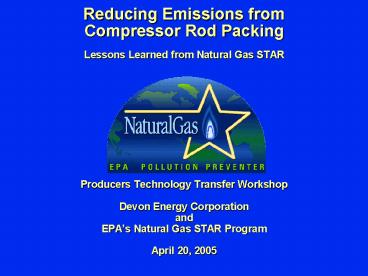Reducing Emissions from Compressor Rod Packing - PowerPoint PPT Presentation
1 / 18
Title:
Reducing Emissions from Compressor Rod Packing
Description:
Lessons Learned from Natural Gas STAR Producers Technology Transfer Workshop Devon Energy Corporation and EPA s Natural Gas STAR Program April 20, 2005 – PowerPoint PPT presentation
Number of Views:143
Avg rating:3.0/5.0
Title: Reducing Emissions from Compressor Rod Packing
1
Reducing Emissions from Compressor Rod Packing
- Lessons Learned from Natural Gas STAR
2
Agenda
- Methane Losses
- Methane Recovery
- Is Recovery Profitable?
- Industry Experience
- Discussion Questions
3
Methane Losses from Production
- Production responsible for 42 of methane
emissions
Oil Downstream 2 Bcf
1 Bcf
Processing 36 Bcf
10 Bcf
Production 150 Bcf
Distribution 73 Bcf
25 Bcf
18 Bcf
Transmission Storage 98 Bcf
Inventory of U.S. Greenhouse Gas Emissions and
Sinks 1990 - 2002
4
Methane Losses from Compressor Rod Packing
- Reciprocating compressors account for 2 of
production sector emissions - Gas lost from rod packing is estimated to be over
- 350 MMcf/yr costing over 1 million (gas price
of 3/Mcf)
Other Sources 15 Bcf
Meters and Pipeline Leaks 11 Bcf
Pneumatic Devices 60 Bcf
Gas Engine Exhaust 12 Bcf
Well Venting and Flaring 12 Bcf
Inventory of U.S. Greenhouse Gas Emissions and
Sinks 1990 - 2002
Dehydrators and Pumps 14 Bcf
Storage Tank Venting 23 Bcf
Reciprocating Compressors 3 Bcf
5
Compressor Rod PackingWhat is the Problem?
- Rod packing accounts for 12 of reciprocating
compressor emissions in production sector - Over 44,000 reciprocating compressors in natural
gas industry - Over 31,000 compressors in gas production sector
6
Methane Losses from Rod Packing
- Reciprocating compressor rod packing leaks some
gas by design - Newly installed packing may leak 11 cubic feet
per hour (cf/h) - Worn packing has been reported to leak up to 900
cf/h
7
Reciprocating Compressor Rod Packing
- A series of flexible rings fit around the shaft
to prevent leakage - Rings held in place by springs and packing cups
8
Methane Loss Sources from Rod Packing
- Leakage occurs
- Around packing case through nose gasket
- Between packing cups
- Around rings due to movement of the piston rod
- Between rings and piston rod
- Leaking gases escape either through vents on the
packing flange or into the distance piece - Leakage gradually increases from normal wear of
rings and rod
9
Methane Recovery with EconomicRod Packing
Replacement
- Leak rates from rod packing eventually increase
to a level that economically justifies packing
replacement - Frequency of economic replacement depends on
lubrication, rod alignment, rod wear, rod
material and economic hurdle-rate - Benefits of economic packing replacement
- Reduced methane emissions
- Gas savings with lower leakage rates
- Extended service life of compressor rods
10
Rod Packing Replacement Decision Process
11
Establish Baseline Leaks
- Step 1 Monitor and record baseline leakage and
rod wear - Measure leaks immediately after installing new
seals (or new rods and seals) - Monitor rods periodically for shaft dimensions
and surface roughness when replacing rings - Out-of-round rod seals poorly causing uneven
wear and allowing more leakage - It also causes uneven wear on the seals
shortening the life of both seal and rod
12
Establish Leak Reduction Expected
- Step 2 Compare current leak rate to initial leak
rate to determine leak reduction expected - Leak Reduction Expected (LRE) Current Leak Rate
(CL) Initial Leak Rate at the last ring/ rod
replacement (IL) - Example The current leak rate is measured as 50
cf/h, the same component leaked 10 cf/h when
first installed - LRE 50 cf/h 10 cf/h LRE 40 cf/h
13
Assess Costs for Economic Rod Packing Replacement
- Step 3 Assess cost of replacements
- Packing ring replacement costs depend on the
number of cylinders and the type of ring - Cost of a set of rings 500 to
800(with cups and case) 1500 to 2500 - Rod replacement costs vary with rod dimension and
rod type - Cost of Piston Rod 1800 to 3500
- Installation costs roughly equal equipment costs
14
Replacement Threshold for Economic Rod Packing
Replacement
- Step 4 Determine economic replacement threshold
- Economic replacement threshold defines the
specific point at which it is cost effective to
replace rings and rods - Discounted cash flow method
- Economic replacement threshold (cfh)
- (CRDF1,000) / (HGP)
- where, CR cost of replacement ()
- H hours of compressor operation per
year - GP gas price (/Mcf)
- DF discount factor i(1i)n / (1i)n 1
- i discount rate or company hurdle rate
- n payback period selected
15
Is Recovery Profitable?
- Step 5 Replace packing and rods when cost
effective - Example
Rod and Rings Rings 1,200 Rod 7,000 Gas 3
/Mcf Operating 8,500 hrs/yr
Rings Only Rings 1,200 Rod 0 Gas 3/Mcf Op
erating 8,500 hrs/yr
Based on 10 interest rate Mcf thousand cubic
feet, cfh cubic feet per hour
16
Industry Experience on New Rod Packing Material
and Coatings
- New packing materials can improve the life and
performance of equipment - Carbon impregnated Teflon rings cost almost the
same as bronze rings but last about one year
longer - Other factors like proper installation, cooling
and lubrication play an important role - Piston rods coated with tungsten carbide or
chromium increase service life of rods - Axially loaded packing installed in one of the
last two cups reduces emissions
17
Axially Loaded Three Ring Rod Packing
18
Discussion Questions
- What is your practice on replaced rod packing in
reciprocating compressors? - How can the Lessons Learned study be improved
upon or altered for use in your operation(s)? - What are the barriers (technological, economic,
lack of information, regulatory, etc.) that are
preventing you from implementing this technology?

